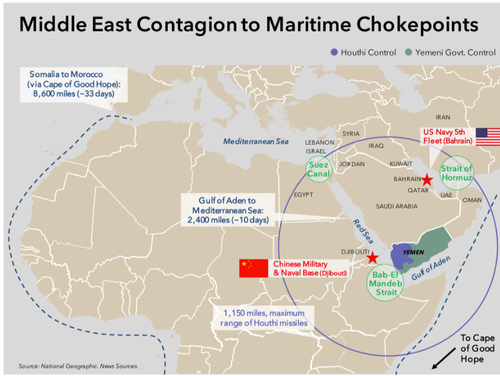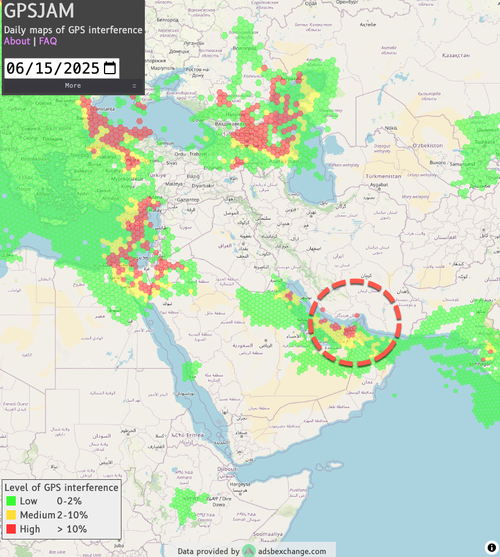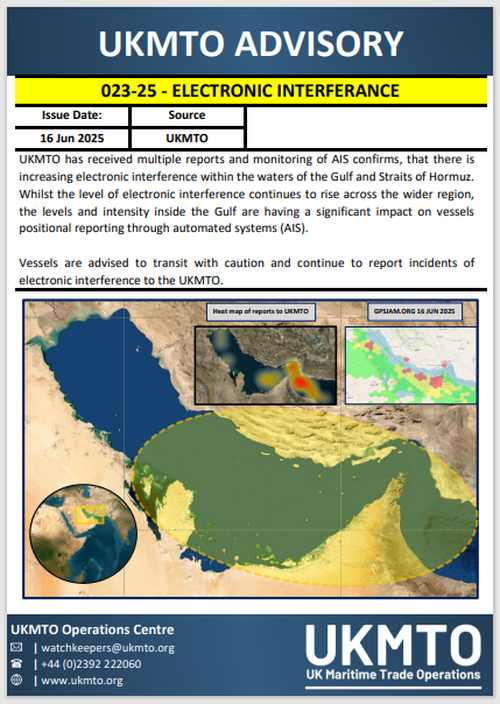
Chokepoint Watch: GPS Jamming Impacts Tankers Across Strait Of Hormuz
Despite Israel and Iran volleying missiles and bombs at one another over the weekend, Brent crude futures showed a surprisingly muted reaction Monday morning, initially gapping higher Sunday evening but flat to down.
Goldman Sachs analyst Ananya Prakash added color about the market’s restrained response, telling clients the „situation feels relatively contained” for now, with attention centered on potential supply disruptions—particularly the extreme scenario of Iran moving to close the Strait of Hormuz.

Bloomberg reports a surge in GPS jamming around the Strait of Hormuz, scrambling navigation for more than 900 vessels and hinting at a new form of disruption for the world’s most critical maritime chokepoint.
Here’s more from the report:
Starboard Maritime Intelligence and Bloomberg data showed vessels sailing impossibly straight lines in the region, zig- zagging across the water, or appearing onshore. The glitches — which have affected oil tankers, cargo ships, tugs and fishing boats among others since Friday — increase reliance on radars, compasses and eyesight, boosting the likelihood of collisions.
The Joint Maritime Information Center, an international naval task force monitoring the area, warned on Sunday that there are instances of „extreme jamming” of signals from the Iranian port of Bandar Abbas.
GPSJam—a site that publishes daily heat maps of GPS/GNSS disruptions affecting aircraft—shows multiple „high-interference” zones clustered around the Strait of Hormuz.

The United Kingdom Maritime Trade Operations said on Monday it had received multiple reports of increasing GPS interference in maritime chokepoint:
UKMTO has received multiple reports and monitoring of AIS confirms, that there is increasing electronic interference within the waters of the Gulf and Straits of Hormuz. Whilst the level of electronic interference continues to rise across the wider region, the levels and intensity inside the Gulf are having a significant impact on vessels positional reporting through automated systems (AIS).

Despite reports of „high” GPS jamming across parts of the maritime chokepoint, there are currently no signs of an imminent Iranian blockade. However, any move to choke off the strait, which handles roughly a quarter of global oil trade, would likely send Brent crude futures soaring into triple-digit territory.
However, a separate Bloomberg report found some oil tanker operators and managers have paused offering their vessels for Middle East routes since Friday to let the dust settle.
JPMorgan commodity analyst Natasha Kaneva issued a warning over the weekend, stating that the odds increased of a „worst-case scenario” —defined as „the oil price reaction turning exponential rather than linear, with the impact on supply potentially extending beyond a 2.1 mb/d reduction in Iranian oil exports”—could push prices as high as $120–$130 per barrel. Read the full note here.
Tyler Durden
Mon, 06/16/2025 – 09:25
















